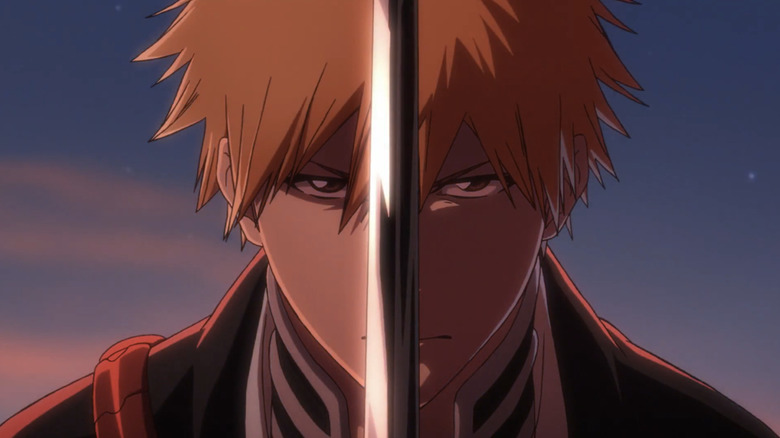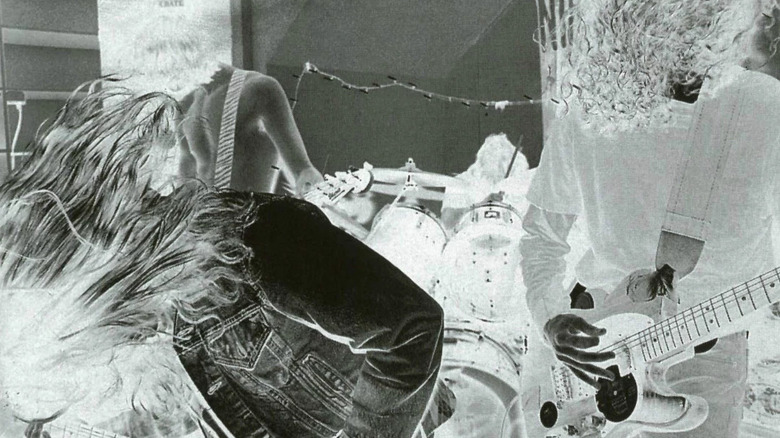Why Is It Called Bleach? The Anime's Unusual Title Explained
We may receive a commission on purchases made from links.
Tite Kubo's manga "Bleach" is often described as one of the "Big Three" of its magazine publisher Weekly Shonen Jump, alongside Eiichiro Oda's "One Piece" and Masashi Kishimoto's "Naruto." The three have that name for a simple reason: During the 2000s, they were the three most popular "battle shonen" manga/anime series out there. For many anime fans (like actor Michael B. Jordan), they remain huge touchstones.
"One Piece" has its title because its pirate hero, Monkey D. Luffy, and his crew are searching for a treasure called the one piece. "Naruto" is named after its protagonist, Naruto Uzumaki, a young orphan and aspiring ninja bonded to a fox demon. But "Bleach"? That title is much less intuitive.
Unlike the other two series, which are set in fictional worlds, "Bleach" takes place in a supernatural twist on the real world. Japanese teenager Ichigo Kurosaki has two traits that stand apart from his peers. One, he's got strawberry blond hair (colored as orange). Two, he can see and talk to ghosts. Ichigo's life forever changes when a malevolent spirit called a Hollow attacks his family, at which point they're saved by Rukia Kuchiki, a Shinigami (Japanese death spirit, translated as "Soul Reaper" in English).
Rukia is wounded fighting the Hollow, so she transfers her powers (embodied in a magical sword called a "Zanpakutō") to Ichigo. While she heals, he has to balance his new double life as a high school student and Soul Reaper. As "Bleach" goes on, it explores different realms such as the Shinigami's native Soul Society, while moving away from ghost hunting in favor of duels.
So, what does this story about Shinigami sword fights have to do with cleaning chemicals? Why "Bleach?" Fans and new readers keep asking that question, but the answer lies nestled in a 2008 interview with Kubo by Anime Insider magazine.
"Bleach" wasn't Kubo's first idea for the manga's title, but it refers to the characters' clothing. The Soul Reapers, including Ichigo, all wear black and white kimonos, but "Black" and "White" would be too "simple" and "straightforward" as titles. "If you put 'bleach,' somebody can associate that with white. So, that's how 'Bleach' came," Kubo explained.
Is Bleach the anime titled after the Nirvana album?
Since the root of the "Bleach" title isn't explicitly spelled out in the story, some readers have interpreted the title their own way. One common read is it refers to how Ichigo and other Soul Reapers purify, or bleach, the corrupted souls of Hollows. Others have suggested it's a reference to a different "Bleach" altogether — not a cleansing chemical, but rock band Nirvana's 13-track 1989 debut album, "Bleach." According to the 1993 biography "Come As You Are: The Story of Nirvana" by Michael Azerrad, the album's title comes from a time the band was driving in San Francisco and saw an anti-AIDS campaign poster reading "bleach your works" (meaning to clean needles) and got inspired:
"There was even a guy dressed up as a bleach bottle walking around downtown handing out bottles of bleach. 'We were contemplating how bleach could become the most valuable substance on Earth,' says [Bruce Pavitt, co-founder of Nirvana's initial label Sub Pop Records]. And so 'Bleach' became the title of Nirvana's as yet unreleased first album."
The Nirvana theory holds some water because Kubo is a music and rock aficionado. He has even picked theme songs for many major characters (Ichigo's is "News From the Front" by Bad Religion), and those themes are included in character profiles in the back of "Bleach" manga volumes. "Burn the Witch," a London-set "Bleach" spin-off series, even shares its title with a Radiohead song.
However, despite that, Kubo has not explicitly said Nirvana's "Bleach" inspired his manga's title. (For what it's worth, he picked Nirvana's "Rape Me" as the theme for the sadistic and flamboyant "Bleach" villain Szayelaporro Granz.) But the Nirvana link would be as thematically fitting as the "bleaching souls" read on the title.
Ichigo has a punk rock attitude worthy of Kurt Cobain, which is unusual for a shonen protagonist. Ichigo doesn't set out to be the very best at something, he just wants to live his life and protect those he loves. The second major arc of "Bleach" is about him fighting against the Soul Society to rescue an imprisoned Rukia. He's working against, not for, an authority system.
Yet, that attitude contributes to the later aimlessness of "Bleach." Ichigo's understanding of his powers and strengths deepens as the series goes on, but he (and thus the series) never comes to actually stand for or believe in anything besides himself and his friends. He eventually winds up working for the Soul Society as another Soul Reaper agent, too, happy to partake in the system if it's not mucking up his life. A punk teen selling out as they grow up? It's a tale as old as time.

